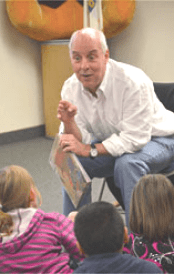Bill Harley Goes to School
For forty years Bill has traveled the globe visiting schools. Able to reach all grades with his wide variety of stories, books, songs, and experiences, Bill can tailor his work to your setting and needs.

Intrigued? Have Bill come to your school to lead a classroom workshop for students or a storytelling workshop for teachers and librarians by contacting Debbie Block via the information at the bottom of this page. Read on to learn more.
Author Visits
Overview
A typical day may include 2 large-group music and story assemblies with children divided by grade level (e.g., K-2, 3-5), 2 classroom workshops and a book signing. Additional classroom workshops, teacher workshop and family concert are optional additions for multi-day residencies. Classroom workshops are appropriate for grades 3-5 and are limited to 40 students per session. The class should have read one of Bill’s chapter books before the visit.
The more familiar students and teachers are with Bill’s work, the richer the visit will be. We will make recommendations for the books/songs/stories to read and listen to in advance and are happy to sell these materials to your school at a 30% educational discount. We can also work with you to organize a sale to parents. The school will earn 15% of these sales. All books will be autographed.

Classroom WOrkshops
Book Talk: A Closer Look
 A participatory classroom workshop about the nitty-gritty aspects of Bill’s work as an author using one of his books as an example (to be read by the class in advance). Along with a PowerPoint presentation, Bill will lead an animated discussion of plot, character development, writing tools, strategies and story creation. Workshop will encourage and support young writers (and their teachers). Topics may include how life experiences and curiosities influence a storyline and characters, relationship between author and illustrator and the use of vivid language and sensory details in writing. Questions from students will be an important guide for this session.
A participatory classroom workshop about the nitty-gritty aspects of Bill’s work as an author using one of his books as an example (to be read by the class in advance). Along with a PowerPoint presentation, Bill will lead an animated discussion of plot, character development, writing tools, strategies and story creation. Workshop will encourage and support young writers (and their teachers). Topics may include how life experiences and curiosities influence a storyline and characters, relationship between author and illustrator and the use of vivid language and sensory details in writing. Questions from students will be an important guide for this session.
Telling Stories – the pictures in your head
Brain science now tells us that strong oral skills provide a clear pathway to literacy. In this workshop, Bill introduces students and teachers to the basics of storytelling. Through examples (a good story from Bill) and participatory exercises, he gives students a start on being able to tell their own story. Teachers will also learn some simple techniques to continue exploring the world of story as a way to increase students’ confidence as well as their oral and literary fluency.
Character, Plot, and Setting
Using one of his books as an example, this participatory workshop explores how to develop characters and plot using setting as an influential element in story. Bill shows how character drives the plot, and how to structure a plot that is exciting and meaningful. Students leave with a better understanding of how stories are developed, and the ability to identify different elements in a story.
“This was a fantastic workshop!! I love the idea of telling a story and having the students retell the story. The “sequencing” by drawing is also another fantastic idea. You are very talented and have such great insight!”
—workshop participant
Please visit the Keynotes & Conferencess page for information about workshops for teachers and librarians.
“After watching this TEDx clip, you may never want to stand before an audience again without pausing, at least once, to utter these seven magic words: “Let me tell you a little story.”
… most advice about the importance of narrative comes from psychologists and communication consultants, not storytellers. So here is a master storyteller, Bill Harley, talking about his life’s work, and sharing what he’s learned about why storytelling is so central to human understanding…”
—Tom Smerling, Think Progress
Bill's Philosophy
Everybody worries about things being “educational’ with kids. I believe everything IS educational, in that it says something about how one looks at the world—it imparts a knowledge, or world-view. Children learn more from context than they do from explicit lessons, so assume they’re working to understand something—they learn vocabulary and language not from a dictionary or worksheet, but from conversation, they learn songs not from reading music, but from singing with someone who loves to sing, and they learn hope and kindness and cooperation not from being told to have them, but by experiencing them.
Contact Debbie Block to find out more about Artist Residencies,
Bill’s author visits and workshops, or about bringing Bill to your school.
Email debbie@billharley.com or call 508-336-9703